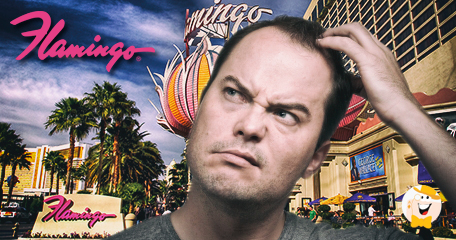
Maximum Aggregate Payouts suck.
/article
Just kidding, but they really do. Essentially, what they involve is an arbitrary maximum possible win on table games regardless of the amount bet. They also apply to the entire table as opposed to each player.
Effectively, a Maximum Aggregate Payout increases the house edge (reduces the return to player) because if one or a combination of players bet such that it comes into play, they don’t get paid according to the paytable if they hit a huge hand.
While they do suck, they are technically fair, provided that the Maximum Aggregate Payout is at least high enough that a full table could bet the minimum and it wouldn’t come into play. Of course, players have to know that there is a Maximum Aggregate Payout in place, which is why land-based casinos almost universally have signage placed to that effect.
Almost universally.
We are going to start this article with an interview with a gentleman who goes by, ‘Armyegad,’ on the WoV Forums. Given that the event took place at a specific casino, he doesn’t wish to use any part of his real name as that would make him extremely easy to identify. I have verified his information and the veracity of the story to my satisfaction.
The lead-in is that Armyegad was playing Pai-Gow Poker at the Flamingo (a CET property) on the Las Vegas Strip. He was betting $10 on the bet commonly known as, ‘Pai-Gow Bonus,’ WoO provides a paytable on this bet:
Bonus Bet Return Table
| Total: | 154143080 | 1.000000 | -0.077656 | 0.009268 | ||
| EVENT | DYNASTY PAYS | ENVY BONUS | COMBINATIONS | PROBABILITY | DYNASTY RETURN | ENVY BONUS |
| Natural 7-card Straight Flush | 8000 | $5000 | 32 | 0.000000 | 0.001661 | 0.000208 |
| Royal Flush + Natural AQ Suited | 2000 | $1000 | 72 | 0.000000 | 0.000934 | 0.000093 |
| Wild 7-card Straight Flush | 1000 | $500 | 196 | 0.000001 | 0.001272 | 0.000127 |
| Five Aces | 400 | $250 | 1128 | 0.000007 | 0.002927 | 0.000366 |
| Royal Flush | 150 | $50 | 26020 | 0.000169 | 0.025321 | 0.001688 |
| Straight Flush | 50 | $20 | 184644 | 0.001198 | 0.059894 | 0.004791 |
| Four of a Kind | 25 | $5 | 307472 | 0.001995 | 0.049868 | 0.001995 |
| Full House | 5 | $0 | 4188528 | 0.027173 | 0.135865 | 0.000000 |
| Flush | 4 | $0 | 6172088 | 0.040041 | 0.160165 | 0.000000 |
| Three of a Kind | 3 | $0 | 7672500 | 0.049775 | 0.149326 | 0.000000 |
| Straight | 2 | $0 | 11034204 | 0.071584 | 0.143168 | 0.000000 |
| Losing combinations | -1 | $0 | 124556196 | 0.808056 | -0.808056 | 0.000000 |
Because the, ‘Envy Bonus,’ pays a flat amount, the house edge increases the more the player bets with or without a maximum aggregate payout. With two other players at the table, as was the case, the house edge betting $10 on the side bet is 6.84%.
As you can see, the probability of hitting the top pay is not terribly large, but any maximum aggregate payout would still increase the effective house edge against the player infinitesimally.
As Armyegad first reported in this thread.
The long and short of the story is that Armyegad placed a $10 side bet, hit the Natural Seven Card Straight Flush. It only led to the casino mistreating him by paying him $50,000 as opposed to the $80,000 he had coming by claiming there was a maximum aggregate payout and placing signage on the table after the fact! Wanting some more details, I requested an interview with him and he granted it, that interview follows here:
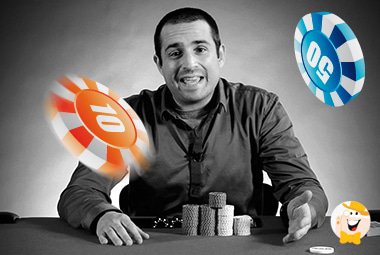
Brandon James: You hit the $80,000 with a Natural Straight Flush on Pai-Gow Poker, is that on a side bet of some kind?
Armyegad: It's on the Pai-Gow Bonus, I had $10 up and it pays 8,000-to-1 on a natural straight flush.
Brandon: The thread also mentioned two players getting paid on the Envy Bonus. Did they have to bet $10 for that, is it a function of the bet or is it a flat amount?
Armyegad: If you're playing $5, or more, on the bonus, then you qualify for the Envy Bonus which is a flat $5,000 payout.
Brandon: The problem is that the Flamingo wanted to have a Maximum Aggregate Payout, but there was no sign on that table. Clearly, there's no Maximum Aggregate Payout if it is not advertised on the table.
Armyegad: There were no signs on any of the tables, I'd never heard of a Maximum Aggregate before this happened.
Brandon: They did have signs available that they eventually put out, though. I wonder if anyone else has ever got shorted by this?
Armyegad: As a matter of fact, it was one of the dealers that said it happened on a different game in which a lady would have won $120,000, but only got paid $50,000, not too long ago. It was that dealer that actually told me about the gaming commission. He said he'd complain to them if it would have been him. He said he would take it up with them.
Brandon: So, they put a sign on the table you were playing after the fact and then put Maximum Aggregate signs everywhere else?
Armyegad: No! They didn't put signs on all the other tables until the next day. I talked to a guy who came from upstairs whose card just said, 'Casino Manager.' He looked everywhere for signs to put on the tables and still ended up one short. He ended up offering me a free dinner, so I got a $300 food comp. That's all they were going to give me, and they didn't do anything for me that first day.
Brandon: Wait, they still didn't put out the signs after the night before?
Armyegad: No, the manager was digging them out of drawers, under the tables, checking every nook and cranny and they still ended up one short.
Brandon: Did the manager say anything about discussing the matter with Gaming?
Armyegad: No, it's bad enough they whipped the sign out of nowhere the night before and then never offered to comp me anything only to reluctantly offer me a dinner the next day. Nobody from the casino, except for that one dealer the next day, said anything about contacting Gaming.
Brandon: If you knew about the Maximum Aggregate Payout and what it means, would you still have bet $10 on the bonus bet?
Armyegad: It's hard to say. Sometimes, I'll put $200-$300 on the bonus bet on my last hand of the night. Even if you hit one of the lower pays, you can do pretty well. I won't bet that much now.
Brandon: Did it seem unusual that they would potentially face a payout in the hundreds of thousands depending on how much someone bets?
Armyegad: They used to pay $100,000 for any seven card Royal Flush and one million if it was a natural seven-card royal in diamonds, but they did away with that. I knew those were gone, but they never mentioned any Maximum Aggregate Payout. If they have a Maximum Aggregate now, it's not going to change, so there's no excuse not to have a sign for it unless they are trying to get bigger bets.
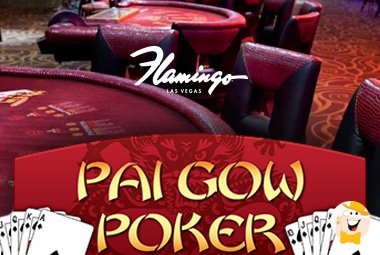
Brandon: Do you think that there are some people who would bet less if they knew? Like, maybe the Flamingo has gotten bigger bets from people that they would have otherwise?
Armyegad: I do believe that after talking to other dealers, plus that lady who should've won $120,000. I was there for three more days after this and people definitely will tend to bet higher not knowing there is a win limit. There's just no excuse. It could be permanently printed on the table. The felt is always going to be Pai-Gow Poker, it's not like they're going to open tomorrow and it's going to be a Blackjack table.
Brandon: I imagine some have even played huge amounts on the bonus such that they'd get shorted on pays other than the top pay.
Armyegad: Of course, even on some of the smaller payouts. A player might drop $100 on the bonus at the end of the night, or to try to get their stack back up. They might bet the max on three or four hands on other games, (with a max aggregate payout on the base game) it's hard to say how many people have been affected.
Brandon: How surprised were you to find you were not to be paid $80,000?
Armyegad: The damn dealer thought I was getting 80k! The whole table thought I was getting 80k! Then, some pit boss comes and starts messing around on his computer for twenty minutes, he won't answer any of my questions. Eventually, he turns his computer to me and said, 'You're only getting $50,000, this table has a maximum aggregate payout of $50,000.' After that, they found one of the signs and put it on the table.
Brandon: Right in front of you?
Armyegad: Yeah!
Brandon: Did you try to argue in favor of the 80k that night?
Armyegad: I've been a loyal customer of the Flamingo once or twice a year for six years. I work overseas and I go to Vegas once or twice a year with $5,000 to either spend or retire. Of course, I tried to get the 80k, but then one guy looked at me and said, "You're lucky to get anything."
Brandon: How's that? Just saying lucky to win? Trying to intimidate you?
Armyegad: Whether he was trying to intimidate me or not, it worked. There were no apologies from him at all, and when he said I was lucky to get anything, that shut me up. My dad was at the casino with me, so I had been trying to call him a few times. I stepped back from the table each time, but I was worried they'd try to accuse me of cheating somehow, so I just kept my mouth shut after that.
Brandon: How did the procedure with the Nevada Gaming Commission work?
Armyegad: I had returned (to where I work) and called them once I found their number. I had seven days to make the complaint, luckily it was the seventh day. The guy told me he would assign an agent to it and they would request surveillance video. Had I called them one day later, probably nothing would have been done.
I got called about ten days later, we had a phone interview, and I answered some questions. He stated that there has to be a Maximum Aggregate sign on the table visible to all the players and that did not happen here, so that gave me hope it'd be an open and shut case.
Brandon: And, it was. As we know, you won the case, so how did the process of getting paid the difference go?
Armyegad: Gaming mailed W2-G's to me for a signature. Basically, the casino cut gaming a check for the full amount and the check will be released when I send in the paperwork.
Brandon: Will knowing about the Maximum Aggregate make gambling less fun in the future?
Armyegad: That kind of takes away half of my reason for going there. I'd never heard of a Max Aggregate until I got hit by it. I take $5,000 or so with me per trip planning to either spend it or retire. Imagine if I'd have had $200 up and got hit with the Maximum Aggregate. I bet they would have fought harder then and this might have ended up going to court, but what's $30,000 to them?
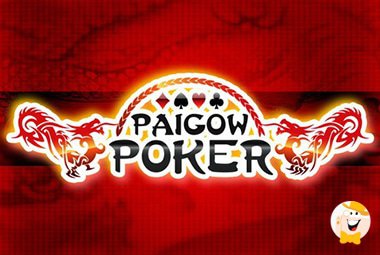
Brandon: Will it change how you bet?
Armyegad: Definitely, now that I know it exists. Obviously, from the forum (WoV), I've become more educated so that I won't be making my big, 'Go Home,' bet anymore. I'll just take the last $200 back to the room with me.
Brandon: What is your opinion of the Flamingo? Would you go back there?
Armyegad: I'm still a little pissed off at the pit bosses. I dump 5k per visit there and have been a loyal customer. They did absolutely NOTHING for me other than make it sound like I was lucky to get anything. What upsets me more than the money is that they knew they were wrong and did nothing to fix it. If I ever do go back there, the first thing I will be looking for is the sign.
Brandon: Are you going to play if it's not there?
Armyegad: I'm not the type to try to hit a big hand and screw them out of money.
Brandon: You're not screwing them, they are offering a game that has a house edge working against you. They put maximum aggregate payouts in place to minimize their liability, but they are more than happy to take the losing bets when players bet such that they would hit the maximum aggregate had they won. The Flamingo tried to screw you, not the other way around, and if they try to play, 'Hide the sign,' they'd be screwing over anyone who sits at that table, too.
Armyegad: That's true.
Brandon: I mean, it has an effect on the edge against the player. It's literally a different game than the paytable says, depending on how much one bets.
Armyegad: That's true like I said, I'm not making any huge bets on that Bonus anymore.
Brandon: I almost get the impression that the casino paid out 30k twice, once by not putting out the sign in the first place, but then it sounds like you might not have pursued it with Gaming had they just treated you right.
Armyegad: Well, first, thanks to that dealer. I wouldn't even have known what a, 'Gaming,' is had it not been for that dealer. I wouldn't have known that there is anyone to go to with something like that.
Secondly, there are all kinds of things that they could have done to make me happy on the night that it happened. They could have apologized for their mistake, offered me comp meals the rest of the week, any number of things. Instead, they treated me like I did something wrong saying I was lucky to get paid anything.
Brandon: Yeah, it sounds like they could have easily gotten out of this 30k.
Armyegad: Here's the thing: $30,000 is a lot for a lot of people, but if I can afford to go to Vegas and spend $5,000 once or twice a year, then $30,000 doesn't really mean that much to me. It's not life-changing money. It would be for some people. For me, if they had just treated me right, from my perspective, no, they probably wouldn't be cutting me a check for another $30,000.
Brandon: Do you think that they might be not placing those signs to encourage higher bets and fewer questions as to what a maximum aggregate payout means?
Armyegad: In my opinion, obviously, they are using it to their advantage.
Brandon: Agreed. Thanks for taking the time for this interview, I really appreciate it!
Armyegad: Thank you for doing it! I hope this information is helpful to players in the future.
Brandon: I'm sure it will be.
What we have is a pretty clear case of a casino not just trying to perpetrate fraud on a player, but trying to on a great player! If I have a player who routinely bets $10 on a 6.84% house edge side bet, who drops $5,000 per trip once or twice a year for over half a decade, and who occasionally puts up $200 on that same side bet...that’s the kind of customer I want!
If I own a casino, especially if it is a casino in the family of one of the largest land-based casino corporations on Earth, (CET) then I’m going to heartily congratulate the guy, buy him dinner, promote the big win on Facebook...etc.
Instead, CET (and, particularly, the Flamingo) thought it would be a better idea to blatantly try to rip this gentleman off (and, I assure you, he is a terrific guy to talk to). They whipped out a Maximum Aggregate sign and put it on the table as he was sitting there after he had already hit his improbable win.
This sort of behavior is usually reserved for only the shadiest of online casinos and is absolutely beyond the pale when it comes to a brick-and-mortar operation. It only further serves to reinforce my already low opinion of the CET properties.
Two different aspects that we can investigate based on this event are Maximum Aggregate Payouts and what you can do if you feel as though you have been wronged by a casino.

Nevada Gaming Commission (and Others):
The first thing that players should know is that many gaming commissions, including that of the State of Nevada, will intervene on a player’s behalf in the event that the player believes a casino has wronged him. The UKGC (United Kingdom Gaming Commission) is one that does not intervene directly between player and casino, but the NGC (Nevada Gaming Commission) most certainly does.
It is essential that a player is aware of remedial methods available to him when playing in a certain jurisdiction, and Armyegad would not have been were it not for the words of a supremely conscientious dealer. He also lucked out in the sense that he reported it on the seventh day to the NGC, had he waited for just one day longer, there might have been no remedy.
Armyegad also has a picture of the hand (on WoV) which might have been essential as evidence, except the surveillance footage that the Commission obtained from the casino was enough to show that the Maximum Aggregate Payout signs had not been placed on the tables during play.
If you are a player and are playing a game in which you might have an issue with the casino, then the sooner you can report it the better. However, it is important to know what the reporting requirements are for a given jurisdiction. Some jurisdictions might have wanted the matter to be reported almost immediately. Additionally, the investigation might have gone through faster had the matter been reported while Armyegad was still at the casino. The Commission might have sent an agent to directly talk to Armyegad and the casino staff involved while he was still at the property.
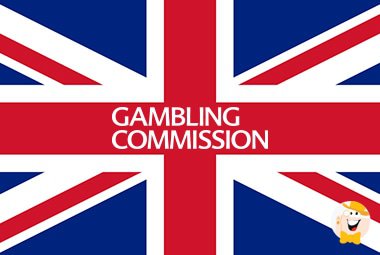
Fortunately, since the matter was pretty open-and-shut, no lengthy investigation was required. However, had the matter been even more complicated, the investigation (and getting paid) may have taken much longer, and direct interviews with casino staff might have been essential.
Player Treatment:
Can you imagine hitting a huge payout on a high house edge bet only to be treated as though you had done something wrong by the casino? As Armyegad pointed out, one of the pit bosses told him that he was lucky to have gotten paid anything. Saying something like that is beyond ridiculous, getting lucky and winning big should be a cause for celebration, not controversy.
Can you imagine the sort of treatment he might have gotten if he was a first-time player in the casino, rather than an established player who drops 5k per visit and visits once or twice per year? Some casinos would happily pay him according to the paytable given that the sign wasn’t posted, and really roll out the red carpet for him in the hopes of getting him to give it back.
This guy is the perfect player, an ideal customer for casinos and his huge win could have been used to generate extremely favorable publicity. Instead, we have this article about a player that the casino tried to rip off for 30k, an infinitesimal amount for them.
Maximum Aggregate Payouts:
If you find yourself at a table with a Maximum Aggregate Payout, it is important to understand what that means for you as a player, and how it should relate to your betting. Fortunately, it is a trivial mathematical affair to determine how much is the most you can bet and be paid according to the paytable if you are the only player at the table. Simply take the Maximum Aggregate Payout amount and divide it by the odds of the top pay. In this case, the Natural Straight Flush pays 8000:1, thus:
50000/8000 = $6.25
You probably cannot bet quarters, but if you could, this means that the most you can bet on this outcome (side bet) without facing an increased house edge (as if it weren’t high enough) is $6.25. Again, that assumes that you are the only player at the table. If there were two players at the table, and both of them somehow hit natural straight flushes on the same hand (a near impossibility), then they would get 25k each. Technically, that means that the most that could be bet to get the full odds would be:
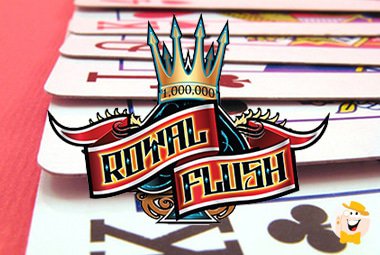
25000/8000 = $3.125
Basically, three bucks.
The Maximum Aggregate Payout can apply to many bets, and occasionally might even apply to the base game, rather than just a side bet. One example (because I’m not going to do this for every single possible game) is Let It Ride. On Let It Ride, the player bets three spots and has the option of taking up to two of his/her bets back if the hand doesn’t look good at that point. However, if the player is dealt three-to-a-royal and another card is turned over that is a Royal card, the player would want to let it ride (keep bets out) all the way.
In this case, the Let It Ride maximum aggregate payout would apply to the total amount laid out across the three initial bets. If each spot calls for a minimum bet of $5, and the maximum aggregate payout is $25,000, a Royal usually pays 1000:1 (per bet) so:
25000/(1000*3) = $8.33
Which means that the most a player could bet and ensure that he/she is not eating an artificially increased house edge, essentially playing against an entirely different paytable, is eight bucks.
In the case of Armyegad, he indicated he would sometimes place as much as a $200 bet on the Pai-Gow Bonus side bet as a, “Go big or go home,” sort of thing. Four hands would result in hitting the Maximum Aggregate Payout of $50,000, including Five Aces. The probability of any such hand is roughly 1 in 125,000, so while unlikely, you still don’t want to get shorted as compared to the intended paytable or effectively increase the house edge against yourself.
Depending on the amount bet and the paytable for a particular game, the Maximum Aggregate Payout can have a greater or lesser effect on the effective house edge. For example, a fairly standard Let It Ride paytable might pay 50:1 on a Four of a Kind, imagine a player is betting $100 per spot on a $25,000 Maximum Aggregate Payout. Would the player be getting the full pay on that result?
25000/(3*50) = $166.67
The answer is, ‘Yes.’ Any bet of less than $166.67 per spot would ensure the full payout on quads if the player were to let all three bets ride. However, the player would run into the Maximum Aggregate Payout on both the Straight Flush and the Royal Flush. Bets of $200 could result in a short pay on even the Four of a Kind.
Some people might say, “Well, those pays are so unlikely, I’m probably not going to hit them anyway. So, why should I worry about the Maximum Aggregate Payout?”
My answer to that is simply: Why are you making the bet, then? You shouldn’t bet against a paytable if your first assumption is going to be that you are absolutely not going to hit one of the possible results. It is the fact that those results are possible that contribute to the house edge being lower than it would be if those results were not possible.
Players need to understand what the maximum aggregate payout means and how it may apply to them. Otherwise, they will potentially face an even greater house edge than the paytable would otherwise suggest.
Unless a player has an advantage somehow, the simple fact is that the house edges of the games are high enough without an artificial maximum pay based entirely on a casino’s discretion. DO NOT help a casino out by giving them a partial free roll on one of your bets by betting too much.
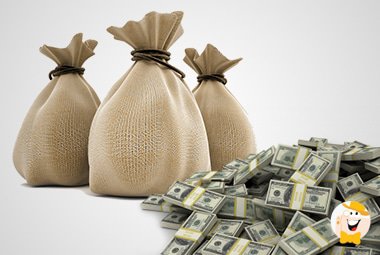
I would not consider going for a huge win against a game with a big house edge a worthy goal. But if you wanted to do it, just pick a game with a low house edge (such as Craps) and let your bets ride until you hit the desired total or the table maximum. A Pass Line bet has a greater probability of winning several times in a row than you do of hitting a particular long-shot result on a side bet or base game such as Let It Ride...and the house edge is much lower, which decreases your expected loss.
Some players might say, “But, I have to bet more to do that.” Well, yes and no. Let’s say that you put up $5 on the Pai Gow Bonus side bet hoping to hit Five Aces (or better) with two other players at the table. The House Edge of 6.84% means that you are expected to lose 34.2 cents on every bet.
On the other hand, the House edge of 1.41% on a Pass Line bet on craps means that the same initial bet of $5 comes with an expected loss of 7.05 cents. That’s just over one-fifth of the expected loss on the same initial five dollars.
Granted, letting your bets ride in Craps will eventually result in an overall expected loss that is greater than the 34.2 cents on the Pai Gow Poker Bonus bet, but in aggregate, your expected loss will be reduced. Let’s take a look at the probability of winning 400:1 ($2,000+) on an initial bet of $5 in Craps:
1-2-4-8-16-32-64-128-256-512
The first thing that we see is that, by fully letting the bet ride, we would have to win nine consecutive decisions (probability of winning each is .4929) in order to achieve a win of 400x the bet or greater, which in this case would be 512x the initial bet, or $2,560.
(.4929)^9 = 0.00171723354
The probability of such a win is .00171723354, or approximately 1 in 582.33. That sure seems a lot more likely than the roughly 1 in 125,000 to hit Five Aces (or better) on the Pai-Gow Bonus bet, doesn’t it?
Again, the total expected loss on each initial $5 is actually going to vary based on how many total bets the player makes. Fortunately, that is somewhat easy to figure out.
(5 * .0141) * .5071 = 0.03575055 (Lose on First Attempt)
(15 * .0141) * (.4929 * .5071) = 0.05286433828 (Lose on Second Attempt)
(35 * .0141) * (.4929^2 * .5071) = 0.06079927546 (Lose on Third Attempt)
(75 * .0141) * (.4929^3 * .5071) = 0.0642170633 (Lose on Fourth Attempt)
(155 * .0141) * (.4929^4 * .5071) = 0.0654153537 (Lose on Fifth Attempt)
(315 * .0141) * (.4929^5 * .5071) = 0.0655265598 (Lose on Sixth Attempt)
(635 * .0141) * (.4929^6 * .5071) = 0.06510874997 (Lose on Seventh Attempt)
(1275 * .0141) * (.4929^7 * .5071) = 0.06443689945 (Lose on Eighth Attempt)
(2555 * .0141) * (.4929^8 * .5071) = 0.06364644821 (Lose on Ninth Attempt)
(2555 * .0141) * (.4929^9) = 0.06186419705 (Win)
This is an interesting distinction because really you can look at it as making one bet of $5 on the Pass Line to win nine times in a row. The total expected loss of the bets above is:
0.03575055 + 0.05286433828 + 0.06079927546 + 0.0642170633 + 0.0654153537 + 0.0655265598 + 0.06510874997 + 0.06443689945 + 0.06364644821 + 0.06186419705 = 0.59962943522
Which reflects an average total amount bet of:
0.59962943522/.0141 = 42.5269102993
It is across all results. However, if we bet exactly that amount on a proposition with a 6.84% House Edge, the expected loss would be:
42.5269102993 * .0684 = 2.90884066447
As we can see, we face a much lower expected loss on the Craps nine in a row proposition (based on average bet) that we would betting the same amount on the Pai Gow Bonus bet. In fact, we see that the amounts (relative to one another and total bet) remain exactly the same with the Craps proposition losing only roughly 20.614% of the Pai-Gow Bonus proposition.
The expected loss of .59962943522 based on the average total amount bet on the Craps proposition is also relevant because it reflects only a total amount bet of 8.76651221082, less than two $5 bets, on the Pai Gow Bonus proposition, in terms of expected loss. Once again:
8.76651221082/42.5269102993 = 0.20614035087
Only 20.614% of the total bet amount can be bet on the Pai-Gow Bonus going for that win regarding expected loss.
You get a better chance of winning with the effective Reverse Martingale on Craps, you face a lower house edge, your expected loss is reduced and you can get more action for the same expected loss.
I’m not advocating in favor of the Reverse Martingale, or any betting system. I am advocating for the fact that if you want to go for a big, ‘Go big or go home,” bet, you’re better off to try to win multiple decisions in a row on a game with a low house edge and high probability of winning any individual decision. That holds true whether or not there is a Maximum Aggregate Payout and whether or not your initial bet is $5 or $500.

Maximum Aggregate Payout Fairness:
Maximum Aggregate Payouts are a measure taken by most casinos to reduce their potential liability in the unlikely event of a huge jackpot on many games. Most gaming commissions permit this sort of measure, but unfortunately, it does effectively increase the house edge against a player.
At a minimum, any MAP’s in place have to be made known to the player, but the casinos will not do anything to inform the player of the maximum bet the player could make and get the full payout based on the paytable of the bet in question. In my opinion, that information should be posted, such as, “The maximum bet that can be made in this game to ensure the full payout is $6,” or something to that effect.
Unfortunately, that is unlikely ever to happen. The reason why is because it is not enough for most casinos to have a big house edge working in their favor. They want to use maximum aggregate payouts in a fashion that reduces their liability while doing as little as possible to dissuade players from making large bets that increase the house edge against them to an even greater extent.
The only weapon that a player has when dealing with such things is knowledge, and basic math also goes a long way in determining the most that should be bet. I can only hope that players will learn something from the experience of Armyegad and not bet in a way that gives the casino an even bigger edge against them.
Conclusion:
I hope that you enjoyed the interview as well as the information about how to take matters to gaming as well as the Maximum Aggregate Payout.
It is generally a positive to know who you can turn to in the event of a dispute with a casino, and the correct process for remediation. In the case of Armyegad, had it not been for a terrific dealer, he would not have known about the Nevada Gaming Commission or any potential remedies available to him when the casino tried to perpetrate what I consider fraud against him for thirty thousand dollars.
We have also learned that a little bit of positive treatment of players can go a long way on the casino side of the operation. In the interview, we found that Armyegad may not have been as likely to pursue restitution had the casino just treated him as the excellent player (for the casino) that he is, to begin with.
I also hope that all of the readers will now understand what a Maximum Aggregate Payout is and plan your betting accordingly. Furthermore, you should also understand that there are better ways to go about, “Taking a shot,” than going for huge house edge side bets. These alternative means of taking your shot will reduce your expected loss on the overall proposition, the initial bet as well as giving you more chances for the same amount of money in the long run.
I will be linking this article to Armyegad, so hopefully he will have responses if there are any follow up questions. I’m not going to say that he will join this site, but he has been very open with me and is a true gentleman. I imagine if I forward any follow up questions to him, he would be more than happy to answer. As always, thanks for reading, and if I have taught just one player something that he/she didn’t already know...I’ll consider it a job well done.






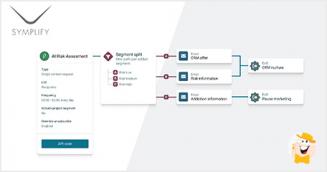
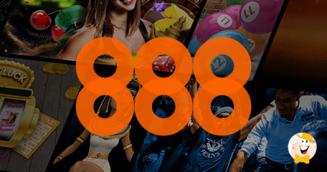


Mission146 6 years ago
6 years ago
Lukyme13, Please call me Brandon, by all means! Thank you for the additional compliments, I'm just glad you found the article enjoyable! The Maximum Aggregate sign must be clearly posted on the table, felt or on a large sign reasonably close to the table in order for it to be enforceable. I would suggest that, ultimately,...
Lukyme13, Please call me Brandon, by all means! Thank you for the additional compliments, I'm just glad you found the article enjoyable! The Maximum Aggregate sign must be clearly posted on the table, felt or on a large sign reasonably close to the table in order for it to be enforceable. I would suggest that, ultimately, the pit boss or some supervisor is immediately responsible, and the Table Games Manager ultimately responsible to make sure that the sign is posted. I stipulate that players have no reason to ask if there is a Max Agg if there is no posting to that effect because most players aren't even going to know what a Max Agg is. Nevada Gaming clearly took the side of ArmyEgad as well they should. The odds cannot be defied, and in my view, there is no such thing as, 'Luck,' only Variance. Colloquially, we all understand the concept of, 'Luck,' but mathematically, it's a meaningless word. In and of itself, Craps is a skill-less negative expectation game and the expected return of any individual bet only varies based on what that particular bet pays, otherwise, everything is always the same. However, you can get into certain situations such as Loss Rebates, Match Play offers and things of that nature that can make Craps Play have a positive expected value.
Show morePlease enter your comment.
Your comment is added.
lukyme13 6 years ago
6 years ago
hello mr james, I really enjoyed reading your article, the main reason being it brought back past memories as well as that feeling of crazy excited joy of winning' that is what made your article so awesome to me... I wanted to share this understanding why I believe it's a great piece. everyone has there own...
hello mr james, I really enjoyed reading your article, the main reason being it brought back past memories as well as that feeling of crazy excited joy of winning' that is what made your article so awesome to me... I wanted to share this understanding why I believe it's a great piece. everyone has there own beliefs, concepts of right and wrong.. knowledge is power more you know the more options and better your position regarding everything- i'm not a expert with the rules/regulations regarding this topic I wss told that the max aggregate sign must be clearly placed on table in plain sight for the players to see yes, it was the casino error or fault ...specifically??? maybe the dealer? who knows? the pit boss with the veiled threat about to lose his job...breaking it down Armyegad lived the reality, saw 1st hand what it is..chance,luck,devine miracle god decided to do the 11th hour save. order is restored the truth is revealed right is might and this time it has prevailed! how's that proof that you can achieve the win that you were entitled and not cheated from... although I played a lot of craps I only have a basic understanding of the odds I had a friend who was a master of calculating the odds...the count on passes made usually comes from the stick man which my friend old me it's a jinx sign.. also the number of passes is remembered the real money is usually made when the pass takes forever to make the point...seems like time is lost till that point is made or craps I believe being lucky is better than being skilled but skill is an asset defying the odds
Show morePlease enter your comment.
Your comment is added.
Mission146 6 years ago
6 years ago
Lukyme13, First of all, thank you for reading as well as complimenting this article! I disagree that it is the player's job to know, I think it's the casino's job to at least post up a Maximum Aggregate sign and then it is incumbent upon the player to ask what that means if the player doesn't know. I've seen situations...
Lukyme13, First of all, thank you for reading as well as complimenting this article! I disagree that it is the player's job to know, I think it's the casino's job to at least post up a Maximum Aggregate sign and then it is incumbent upon the player to ask what that means if the player doesn't know. I've seen situations where dealers have mispaid on losing hands, just for one example, and then later on the casino has explained what happened and asked the player for the money back. It needs to be a fair game on both sides of the table, not just for the casino. Craps is a negative expectation game, I'm just pointing out that Reverse Martingaling is a decent mechanism IF you are trying to hit a big score. In terms of expected return (Return-to-Player) the less you bet, the better, unless there is some reason not directly related to the game (such as a loss rebate) that justifies bigger bets and effectively makes the expected return positive. I'm not sure how many passes I've made in a row, I don't think it was as many as thirteen. I know that I've definitely hit at least nine because I hit a six-point Fire Bet once that someone else had made on my behalf! Anyway, two of the points repeated and I know I had at least one come out winner. I've probably made more passes in a row than that before, via come out winners, but I've never really kept count. Other than the occasional pressure on a Place Six/Eight, I don't vary my bets frequently. Almost never.
Show morePlease enter your comment.
Your comment is added.
lukyme13 6 years ago
6 years ago
this is an awesome read, I used to do Vegas 3 to 4 times a year with friends ,can't remember all the exact details . 4 of us were playing Pai Gow Poker with a $5 kicker at the 4 Queens my sister hit a natural 7card straight flush clubs 5-J it took about hour figure and the w-2 handouts she ended up with $37k and change...
this is an awesome read, I used to do Vegas 3 to 4 times a year with friends ,can't remember all the exact details . 4 of us were playing Pai Gow Poker with a $5 kicker at the 4 Queens my sister hit a natural 7card straight flush clubs 5-J it took about hour figure and the w-2 handouts she ended up with $37k and change , $5k each me and 2 pals all I remember was the wrong..my sister was shorted this happened over 10 years ago...we did get a bunch of comps, ran up a tab at Hugo's .We all usually stayed in town being hicks and all. .. I know were talking knowledge. It is the players, job to know. The casino might be obligated to assist or help that doesn't mean they will. Cheating is another matter altogether...fabrication, lying, or misleading misinformation is the same thing Cheating. One last note- on craps I have made 13 passes once,10 passes once and 9 passes twice but I have never pressed up more than 4 passes did not have the disciple over $30k on the table mine, lost my nerves... thank you very much -lukyme13
Show morePlease enter your comment.
Your comment is added.
Armyegad 6 years ago
6 years ago
Well written and thanks for doing an excellent job capturing my story. Glad to see the guidance incorporated into the story. Hope this story helps other going forward, thank you for what you do! Respectfully, Armyegad
Please enter your comment.
Your comment is added.
Mission146 6 years ago
6 years ago
KeyEleven, Thanks for that compliment, I'm honored you would say such a thing! I'm glad that you (and others) are able to take something useful away from the piece. While I write about a wide range of subjects, by far, those that give me the most enjoyment are those that can educate players. Zuga, Me too!...
KeyEleven, Thanks for that compliment, I'm honored you would say such a thing! I'm glad that you (and others) are able to take something useful away from the piece. While I write about a wide range of subjects, by far, those that give me the most enjoyment are those that can educate players. Zuga, Me too! The NCG is absolutely one of the best regulators, though. Most do not directly intervene with the casino like that, but some do. Nirvana, I agree, especially the huge corporations like CET. I can understand small casinos wanting to protect themselves from unlikely, "Huge Hits," but a multi-billion dollar corporation?
Show morePlease enter your comment.
Your comment is added.
nirvana 6 years ago
6 years ago
wow like these LB CASINOS are not making enough money as it is... shame man
Please enter your comment.
Your comment is added.
zuga 6 years ago
6 years ago
glad to hear Armyegad was paid in full
Please enter your comment.
Your comment is added.
key11 6 years ago
6 years ago
This is, by far, one of the most interesting articles I've read in this forum. This is a rather complicated topic but I feel like I've come away with enough information to make more informed choices at the tables. (By proxy. My Boyfriend has an affinity for table games.) It is also good to know that there ARE resources...
This is, by far, one of the most interesting articles I've read in this forum. This is a rather complicated topic but I feel like I've come away with enough information to make more informed choices at the tables. (By proxy. My Boyfriend has an affinity for table games.) It is also good to know that there ARE resources for players to turn to if they feel like they've been dealt with unfairly., but more importantly, it is a relief to know that these resources actually work! Thanks so much!
Show morePlease enter your comment.
Your comment is added.